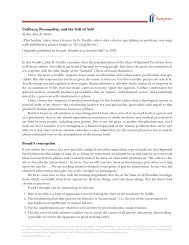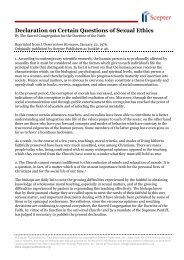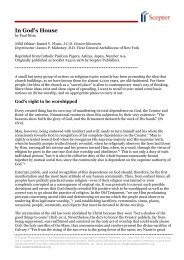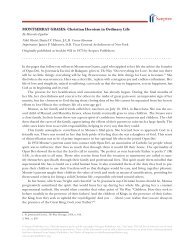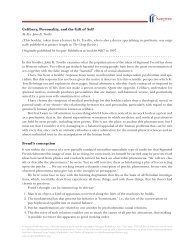by Joseph Soria - Scepter Publishers
by Joseph Soria - Scepter Publishers
by Joseph Soria - Scepter Publishers
You also want an ePaper? Increase the reach of your titles
YUMPU automatically turns print PDFs into web optimized ePapers that Google loves.
One often hears the old saying “time is money,” but time is indeed so much more: “time is glory.” We<br />
have to work with the talent that God has given us, and in this way fulfill his will before our death comes—<br />
“while it is day; night is coming, when no one can work.” St. Josemaria has commented, “Time is our treasure,<br />
the money with which to buy eternity.” Moreover: “if time were only gold, you could perhaps afford to<br />
squander it. But time is life, and you don’t know how much you have left.”<br />
To use an image, it is as if our Lord, when we were born, gave each of us a chest containing the talents<br />
of time that we were going to live: so many coins of gold (one for each year), of silver (one for each month),<br />
of copper (one for each week), and thus down to the tiny coins which represent each second. This chest is<br />
constructed in such a way that it cannot be opened, shaken, weighed to determine how much is left. All we<br />
can do is remove the coins as each instant of the present time passes, never knowing what the remaining<br />
balance is. Nevertheless, and here is the tragic element, we may spend this fortune in having a good time,<br />
wasting it like the prodigal son, on luxurious living, useless pastimes, or senseless laziness.<br />
Tempus breve est (“time is short”). How short indeed is the time of our passing through this world! St. Josemaria<br />
has written: “For the true Christian these words ring deep down in his heart as a reproach to his lack of<br />
generosity, and as a constant invitation to be loyal. Brief indeed is our time for loving, for giving, for making<br />
atonement. It would be very wrong, therefore, for us to waste it, or to cast this treasure irresponsibly overboard.<br />
We mustn’t squander this period of the world’s history which God has entrusted to each one of us.”<br />
There is another factor involved that we can’t ignore, namely, the effect that our failure to make good<br />
use of time has on others. In the words of St. Josemaria, “It would be bad if you were to waste your time,<br />
which is not yours, but God’s and is meant for his glory. But if on top of that you make others waste it, you<br />
both diminish your own standing and defraud God of more of the glory you owe him.”<br />
Arriving late for an appointment, distracting others who are working, interrupting them unnecessarily<br />
– these things cause disorder and mean that others will have to take additional time to make up for the<br />
time we cost them. This is unjust, and we have to make a sincere examination of conscience to improve and<br />
to make reparation.<br />
“If you say that you want to imitate Christ . . . and yet have time on your hands, then you are on the road<br />
to lukewarmness.” This counsel from The Forge gives us a first clue on how to correct the situation we are<br />
considering. We have time to waste when there is a lack of love, when we don’t realize or don’t want to consider<br />
the immense task facing those who have been called to work as coredeemers with Christ. We should<br />
be mindful: “It is no use wasting your time with ‘your own silly little concerns’ when there are so many souls<br />
awaiting you.”<br />
We may also reflect on the following:<br />
A hardworking person makes good use of time, for time is not only money, it is glory, God’s glory! He does as he<br />
ought and concentrates on what he is doing, not out of routine nor to while away the passing hours, but as the<br />
result of attentive and pondered reflection. This is what makes man diligent.<br />
Our everyday usage of this word “diligent” already gives us some idea of its Latin origin. “Diligent” comes<br />
from the verb “diligere,” which means to love, to appreciate, to choose something after careful consideration and<br />
attention. The diligent man does not rush into things. He does his work thoughtfully and lovingly.<br />
Another of enemy of good use of time—the talent God has entrusted us with—is the habit of putting<br />
off things which are difficult, leaving them for later, for tomorrow, for next year. The reason for the delay<br />
in most cases is personal comfort rather than prudence: “Every day is a good day to make good decisions.<br />
Hodie, nunc!—today, now! It tends to be the poor defeatist types who leave it until the New Year before beginning<br />
afresh. And even then, they never really begin.” In addition to betraying undue concern for personal<br />
© <strong>Scepter</strong> <strong>Publishers</strong>, Inc. This information protected <strong>by</strong> copyright of <strong>Scepter</strong> <strong>Publishers</strong>, Inc., New York, NY USA. It is for the free use of readers,<br />
and may be redistributed without permission. None of this information can be sold, either in electronic or print form, unless permission<br />
has been obtained from <strong>Scepter</strong> <strong>Publishers</strong>, Inc. Direct all inquiries to info@scepterpublishers.org.<br />
www.scepterpublishers.org



